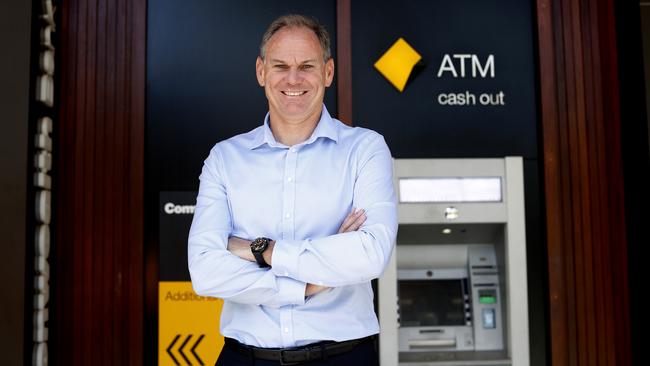Discretionary spending under pressure, but the worst of the retail pain may be over, says CBA
Commonwealth Bank expects retailers, hotels and restaurants to continue to do it tough in the coming months, but it believes the worst is probably behind us.
Commonwealth Bank expects retailers, hotels and restaurants to continue to do it tough in the coming months as discretionary spending is squeezed by higher inflation and interest rates, but says the worst is probably behind us.
Heavy discounting in clothing, footwear and a softening outlook for commercial real estate property would likely continue, said Michael Vacy-Lyle, who heads the business lending unit at the nation’s largest lender.
“Discretionary spending, it’s absolutely under pressure. We’ve seen that for quite some time and we feel that that will continue,” he told The Australian.
Strained retailers are facing rising insolvencies as consumers prioritise essentials over discretionary goods thanks to a cost-of-living crisis. Data from ASIC shows a doubling of retail business insolvencies in October compared with the previous year.
“I think a lot of the pain has already been felt,” Mr Vacy-Lyle said. “We may be through the worst of it. Covid would have shaken out a lot of the smaller worst performers already. So I don’t expect it to get much worse from here.”
His comments come as inflation data on Wednesday surprised for the better. Lower petrol prices, along with reduced airfares and cheaper meat such as lamb, led to a sharp decline in the consumer price index to 4.9 per cent in the year to October, from 5.6 per cent the previous month.
Beyond the upbeat headline figure, core inflation – which “trims” off the largest price moves at either end – fell only marginally to 5.3 per cent in the year to October, down from 5.4 per cent, and the threat of a further rate rise still looms, experts said.
CBA has been losing market share in retail lending in recent months but is making inroads in capturing a larger piece of the small and medium-sized business market.
It is intensifying its pursuit of business customers in key sectors expected to demonstrate resilience in the current economic environment, including agriculture, the rental property market, healthcare and the tradespeople sector.
“It’s not a one size fits all when it comes to business banking, which I think is very important and that’s why you need a diverse portfolio,” Mr Vacy-Lyle said.
“Agriculture, which is a big part of our portfolio, remains robust. Notwithstanding the fact that there’s been a bit of softening in meat prices, we think that agriculture will be resilient and the commodity prices will be resilient.”
Discussing the office space sector, Mr Vacy-Lyle said B-grade and even A-grade office buildings in capital cities continued to struggle with high vacancy rates and were likely to face further pressure as rising interest rates affected valuations.
“There are significant vacancies in Northern Sydney, Western Sydney, Parramatta (and) Melbourne CBD as an example,” he said.
“So office space will certainly be under pressure, however commercial property-industrial is doing incredibly well.”

The bank plans to roll out a new rental payments collection and management platform next year called Smart Real Estate Payments, which it is currently piloting.
The digital service is designed to attract more of the $49bn deposit pool available in annual rental payments, as deposits emerge as a critical focus for banks grappling with rising funding costs.
“We got about 26 per cent share in real estate agents but we are looking to grow that and to increase our deposit market share … and get a disproportionate share of that deposit pool,” Mr Vacy-Lyle said.
CBA will also invest $250,000 in data analytics AgTech firm Pairtree and will use its technology to better analyse the risks customers face in the sector.
It will integrate fragmented customer data to capture key insights around livestock quality, yield as well as their emissions, and help create new products and services for customers, it said.
Earlier in the day, the bank announced it planned to connect savings accounts to its children app “Kit”, which was first pitched as a literacy tool in response to customer demand.
The move follows efforts to add gaming-like content to its 18-month-old app for infants, which it said would connect to a savings account so that children could learn about interest.
Kit is Commonwealth Bank’s “re-imagined” digital version of its controversial Dollarmites school banking program, which was an effective source of customer deposits but was targeted by regulators and consumer groups for exposing potential vulnerable young customers to sophisticated marketing tactics.
CBA scrapped Dollarmites in late 2021 and launched Kit in May 2022 as a financial literacy tool to teach children about how to save and how to use money in the digital age.
The app is already linked to Apple and Google pay to allow children to securely and quickly transfer money, the bank said.
“We’ve had many customers ask us about linking a CommBank saver account to a Kit account to help teach their children about interest,” Kit managing director Yish Koh said.
“I’m excited to announce we are working on doing just that, which means that kids within Kit will be able to see their savings grow as they do.”








To join the conversation, please log in. Don't have an account? Register
Join the conversation, you are commenting as Logout